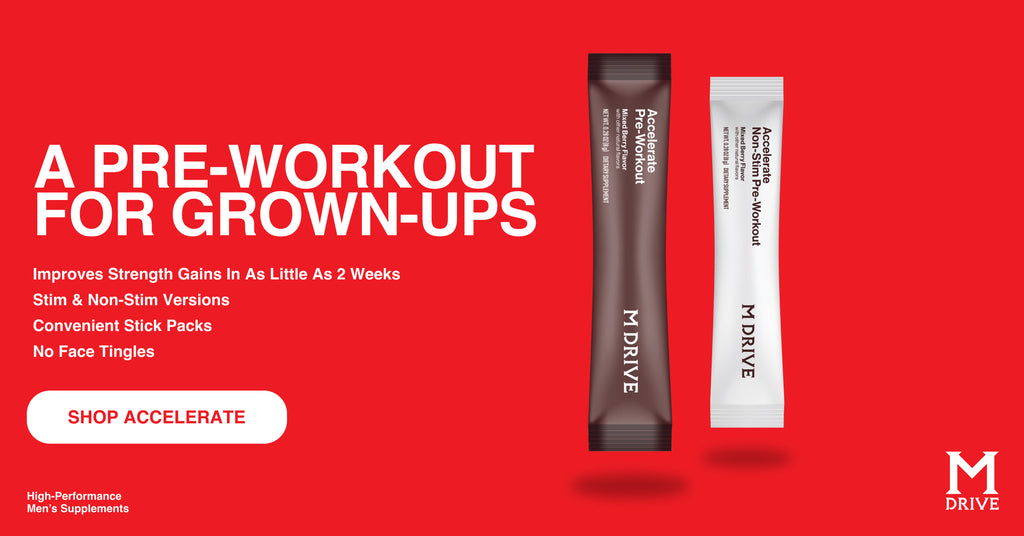
Should You Take Pre-Workout Over 40?
Reviewed by Cecile Kehoe
Chief Science Officer
Discover the benefits of incorporating pre-workout supplements into your fitness routine, especially if you're over 40. Learn how they can help boost energy, focus, and performance, counteracting the effects of aging on your workouts, and how to mitigate the risks.
| Table of Contents |
Introduction
They say 40 is the new 30, and while you may not feel your age, maintaining fitness levels at this stage presents unique challenges. As we get older, building and recovering muscles becomes more challenging, but it's during this time that maintaining your overall well-being and physical health becomes even more important, particularly for injury prevention and maintaining mobility. While there are a variety of strategies to enhance your workouts, you might be overlooking the simple effectiveness of adding pre-workout supplements.
If you're a guy over twenty, you might have skipped trying pre-workout because you're worried about whether they're safe and helpful. But in reality, even into your forties and beyond, using pre-workout supplements can really pay off.
By carefully selecting and considering individual health factors, adding pre-workout before you hit the gym can enhance energy, mental focus, endurance, joint health, and build muscle leading to more effective workouts and overall improvement in fitness.
The Importance of Fitness After 40

Turning 40 is a crucial milestone in our fitness journey. At this stage, our bodies experience significant changes that affect how we engage in physical activities, especially in regards to strength training. Recognizing these changes is essential for developing a personalized approach to fitness.
Understanding Age-Related Changes in Fitness
As we age, several factors come into play that can affect our fitness levels:
Muscle and Strength Decline
As we age, we naturally lose muscle mass and strength. Our bodies undergo normal biological changes, including a decrease in muscle tissue, a process known as sarcopenia. This decline in skeletal muscle mass is a natural part of the aging process. Various factors such as hormonal changes, reduced physical activity, and changes in protein metabolism influence it.
This doesn't just change how we look; it also affects what we can do. Tasks that were once easy may now be difficult, and intense exercise becomes more challenging due to weaker muscles.
Decreased Metabolism and Energy Levels
Metabolism tends to slow down with age, resulting in decreased energy levels and diminished endurance during workouts. This decline in metabolic rate can make weight management more challenging and diminish overall stamina.
When our metabolism slows down, our bodies become less efficient at turning food into energy, leading to fatigue and struggling to maintain high activity levels. This can impact not only our ability to exercise effectively but also our motivation to stay active.
Testosterone Levels
Testosterone, a hormone crucial for muscle growth and overall vitality, naturally declines as we age, particularly in men. This decline usually starts around age 30 and persists through adulthood, causing reduced muscle mass, strength, and energy levels, impacting gym performance. Lower testosterone levels can also increase fatigue, decrease exercise tolerance, and prolong recovery times post-workout.
Why Take Pre-workout After 40: Benefits
 Incorporating a pre-workout supplement into your sports nutrition regimen can counteract the impact of aging on your athletic performance. You don't need to be lifting heavy weights to reap the rewards of pre-workout supplements. They offer numerous advantages that combat age-related declines in fitness performance, whether you're focusing on cardio or weight training:
Incorporating a pre-workout supplement into your sports nutrition regimen can counteract the impact of aging on your athletic performance. You don't need to be lifting heavy weights to reap the rewards of pre-workout supplements. They offer numerous advantages that combat age-related declines in fitness performance, whether you're focusing on cardio or weight training:Boosting Energy Levels for Workouts
One of the most significant benefits of pre-workouts is the immediate boost in energy levels. This surge in energy primes the body for intense workouts, allowing for increased productivity and performance.
Overcoming Fatigue and Lack of Motivation
Fatigue and lack of motivation are common hurdles encountered during exercise, especially as we age. Pre-workout can help combat these challenges by building muscle, providing a burst of energy and enhancing mental focus.
Increasing Stamina and Endurance
Endurance is essential for sustaining prolonged physical activity and achieving optimal results and a pre-workout can extend endurance by delaying fatigue and improving muscle recovery.
Improving Exercise Performance and Muscle Growth
Optimal exercise performance requires a combination of strength, power, and mental acuity. Pre-workout supplements enhance all these aspects, allowing for improved execution of exercises, muscular endurance, and overall performance in the gym.
Enhancing Strength and Power Output
Pre-workout supplements containing ingredients like creatine help increase strength and power output, leading to more efficient workouts and better results.
Delaying Fatigue and Improving Recovery
Fatigue is a common limiting factor during workouts, often leading to premature exhaustion. Pre-workout supplements delay fatigue by replenishing energy stores and buffering lactic acid buildup, allowing for sustained effort and faster recovery post-exercise.
Supporting Overall Health and Well-Being
Pre-workout isn't just for an energy boost for exercise performance; it also benefits your overall health. By adding pre-workout to your routine, it can help manage weight, support heart health, and improve mood.
Maintaining a healthy weight and body composition is essential for long-term health. Pre-workouts can help with body weight by speeding up metabolism and aiding fat loss while preserving muscle mass. They also enhance blood flow, supporting heart health. Additionally, pre-workout supplements can improve mood and mental clarity, making exercise more enjoyable and promoting better overall well-being.
Risks and Considerations of Pre-Workout After 40
Many men over 40 might be hesitant to use pre-workout supplements despite their potential benefits. It doesn't help when many have names like HEART SHREDDER.
Some pre-workout formulas contain high levels of stimulants like caffeine, which can especially negatively affect aging bodies. However, it's important to note that there are many types of pre-workout supplements to choose from. When deciding on a pre-workout, consider various factors, including potential side effects.
Stimulants
As people get older, they might become less tolerant to stimulants, like caffeine, and more sensitive to their effects. Drinking too much caffeine can cause problems like faster heart rate, higher blood pressure, anxiety, trouble sleeping, and stomach issues. It's essential to choose a pre-workout with appropriate levels of stimulants or opt for stimulant-free alternatives.
Ingredients
Opt for products that use high-quality, science-backed ingredients known for their efficacy in enhancing exercise performance and supporting overall health. Look for familiar substances like beta-alanine, beet root, and creatine, which have demonstrated benefits in scientific research. Avoid pre-workout that feature vague ingredient lists, as they may conceal the actual composition of the product and make it challenging to assess its safety and effectiveness.
Formulation
Consider the overall formulation of the pre-workout supplement. Some products may contain additional ingredients like amino acids, vitamins, or minerals that can complement your fitness goals and support overall health.
Pay attention to the dosage of active ingredients in the pre-workout. Ensure that the dosages are appropriate for your age, weight, and tolerance levels. You may want to avoid products with excessively high dosages as they could pose health risks or cause adverse reactions.
Label Transparency
Choose pre-workouts from reputable brands that provide transparent labeling and undergo third-party testing to ensure product quality and safety. Detailed information about ingredient sources, dosages, and purpose should be readily available.
Potential Risks and Precautions
Be aware of potential allergens or ingredients that may cause adverse reactions. Consult with a healthcare professional if you have known allergies or sensitivities. Monitor heart rate and blood pressure responses, especially if you have underlying heart conditions.
Tips for Adding Pre-Workout Into Your Routine

To smoothly integrate pre-workouts into your fitness routine, especially if you're over 40, consider these practical tips:
-
Start Slowly and Increase Intensity Gradually: Begin with a low dose and ramp up gradually to gauge your body's response and tolerance. This approach helps your body adjust and reduces the risk of negative reactions.
-
Listen to Your Body: Pay attention to how you feel before, during, and after taking pre-workout. Adjust the timing and dosage based on your body's signals to find the right balance of benefits and safety.
-
Be Aware of Warning Signs: Watch out for signs of exhaustion or discomfort during workouts, like dizziness, nausea, or unusual fatigue. If you experience any adverse effects, stop using the pre-workout and seek medical advice.
-
Experiment with Timing and Dosage: Try different timing and dosage strategies to find what works best for you. Adjust based on your response and sensitivity to the pre-workout.
-
Optimize Timing for Best Results: Take pre-workout within the optimal window before your workout to ensure maximum effectiveness. This timing may vary depending on the pre-workout and your metabolism.
-
Pair with Proper Nutrition and Hydration: Use pre-workouts as part of a balanced diet and stay hydrated. Have a nutritious meal or snack alongside =pre-workout, and drink plenty of water before and during exercise.
If you follow these guidelines and staying in-tune with your body, you can effectively add pre-workout into your routine after 40. Make sure you gain the benefits while minimizing potential risks! Always consult a healthcare professional before starting any new supplement regimen, especially if you have health concerns.
Key Takeaways
-
Understanding Age-Related Fitness Changes: Aging brings about significant changes in muscle mass, metabolism, energy levels, and hormone levels, which can impact exercise performance and overall fitness.
-
Benefits of Pre-Workout: Adding pre-workouts into your routine after 40 can enhance energy, mental focus, endurance, exercise performance, and overall well-being.
-
Considerations for Safe Use: When considering pre-workout supplements, it's crucial to choose products with appropriate levels of stimulants, high-quality ingredients, transparent labeling, and suitable dosages tailored to your age and health status.
-
Practical Tips for Integration: Gradually introduce pre-workout supplements into your routine, listen to your body's signals, recognize signs of discomfort, experiment with timing and dosage, and combine pre-workout with proper nutrition and hydration for optimal results.
Conclusion
In conclusion, embracing pre-workout after 40 can be a valuable addition to your fitness regimen, enhancing energy levels, performance, and overall well-being.
To benefit from pre-workout while reducing risks, learn about age-related bodily changes, address common concerns, misconceptions, and adopt smart supplement strategies.
Remember to listen to your body, experiment safely, and prioritize consistency in your fitness journey. With the right approach, pre-workout can help you unlock new levels of vitality and achieve your fitness goals well into your 40s and beyond.



